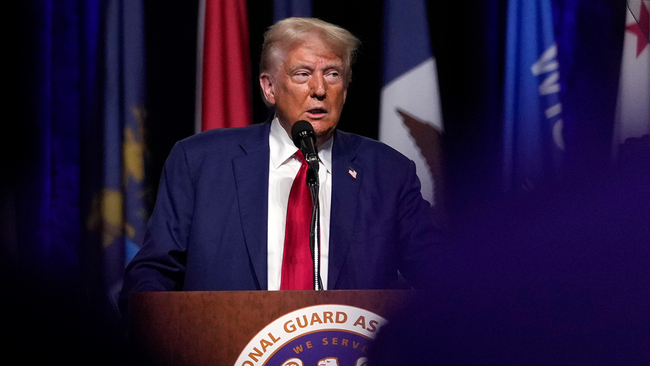US prosecutors have issued revised charges against Donald Trump for the former president’s alleged attempts to interfere in the 2020 election after losing the contest.
The updated wording tries to navigate a Supreme Court ruling that presidents have broad immunity from criminal prosecution for official acts. The ruling had thrown this case into doubt.
Trump denies accusations that he pressured officials to reverse the results, knowingly spread lies about election fraud and sought to exploit a riot at the US Capitol to delay the certification of Joe Biden’s victory.
It appears unlikely the case – and other criminal cases he faces – will reach court before the next election on 5 November.
The revised indictment, brought by Department of Justice (DoJ) Special Counsel Jack Smith, leaves in place the four crimes Trump is accused of committing: conspiracy to defraud the US, conspiracy to obstruct an official proceeding, attempting to obstruct an official proceeding, and conspiracy against rights.
But these now relate to Trump’s status as a political candidate rather than a sitting president.
Trump has previously pleaded not guilty to all charges.
He wrote in a post on his Truth Social platform that the fresh indictment was “an effort to resurrect a ‘dead’ Witch Hunt” and “distract the American People” from this year’s election. He called for it to be “dismissed IMMEDIATELY”.
His campaign has not responded to a BBC request for comment. But a source close to his legal team told CBS News, the BBC’s US partner, the second indictment “was not a surprise”.
“This is what the government is supposed to do based on what the Supreme Court did,” the source said. “It doesn’t change our position that we believe Smith’s case is flawed and it should be dismissed.”
What’s changed – and what hasn’t?
The new charging document – which was slimmed down from 45 to 36 pages – re-works the language of the allegations to respond to last month’s ruling on presidential immunity by the Supreme Court.
It argues Trump acted as a private citizen – and not as president – when he undertook the alleged scheme to sway the election.
“The defendant had no official responsibilities related to the certification proceeding, but he did have a personal interest as a candidate in being named the winner of the election,” reads one new line in the indictment.
Another new line refers to a lawsuit filed by Trump’s campaign in Georgia. The old language said the suit was “filed in his name”, but the updated indictment says it was “filed in his capacity as a candidate for president”.
The new document also appears to have removed the charges against Jeffrey Clark – a former DoJ official who played a key role in the so-called fake electors scheme, according to prosecutors. Mr Clark was not named in either indictment, but has been identified in the media through public records.
The fresh indictment also drops the claim that Trump tried to pressure DoJ officials to work to overturn his defeat. The high court ruled Trump’s direction to justice officials was not illegal.
The special counsel’s office said the superseding indictment had been presented to a new grand jury that had not previously heard evidence in the case.
A grand jury is set up by a prosecutor to determine whether there is enough evidence to pursue a prosecution.
Source:bbc.com





